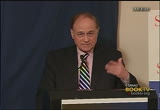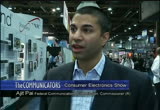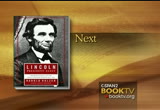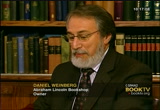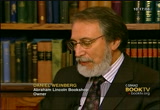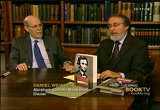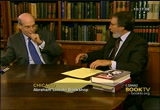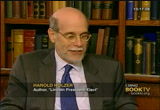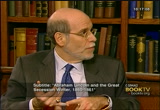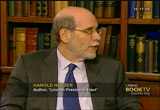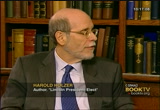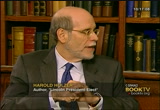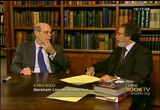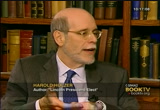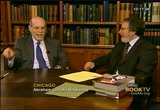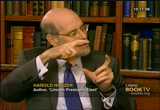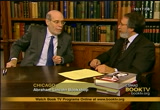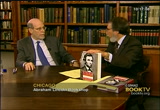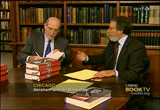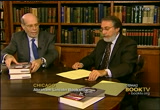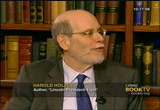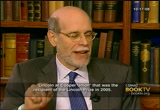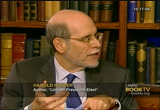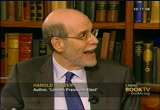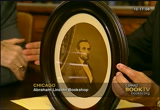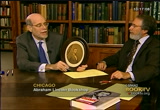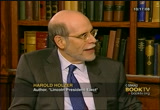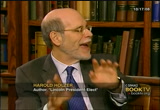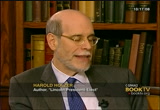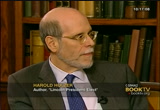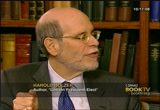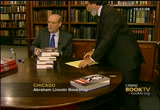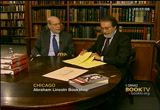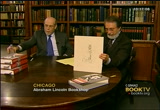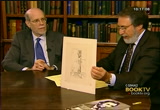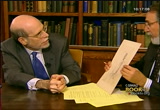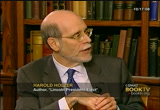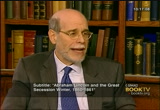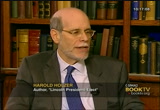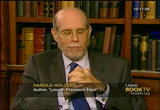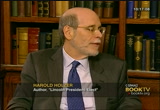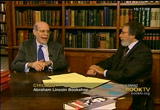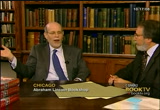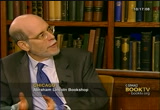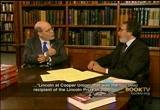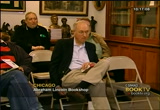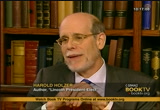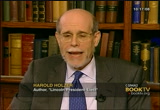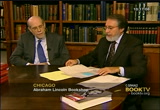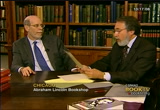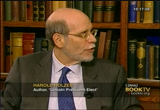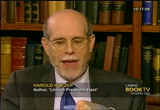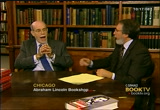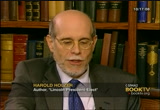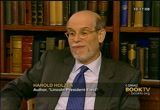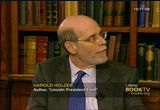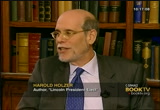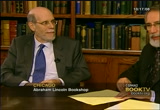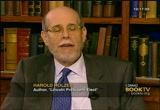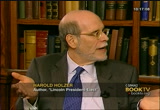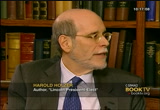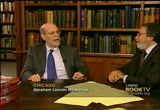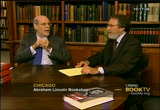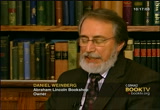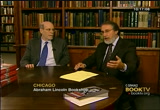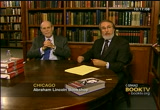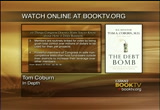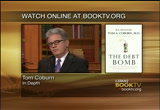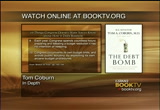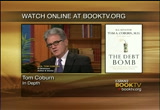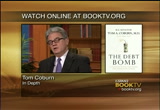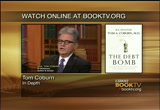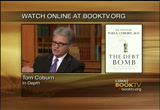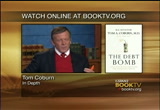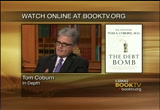tv Book TV CSPAN January 20, 2013 6:00pm-7:15pm EST
6:01 pm
this service or that service. when you come here and see what's possible for example we were able to cd enabled chip that could allow you to have 300 megabits per second of the data that would allow you to watch each dtv on a wireless device very easily. author of numerous books on abraham lincoln recalls the four months between president lincoln's election and a number of 1860 to his inauguration in march, 1861. during this time the president was pressured by republicans and
6:02 pm
democrats throughout the country to maintain the union. it's a little over an hour. >> welcome to the virtual book signing here at the abraham lincoln bookshop as always. i'm daniel weinberg and i am pleased to have you here. it is a lincoln civil war book signing at work. it's a wonderful way for you to build a first edition signed library with all of the books coming out over the next few years in the lincoln bicentennial which is upon us but also the war that follows the heels there are so many books coming out and we are going to try to weed through them and have the authors on the show so you can see the best research going and also you have to weed out others that you don't have to have always. there are too many books out there. >> i say that as a book dealer
6:03 pm
we adjust them for book signings and that is what distinguishes us. if you are watching live, we encourage you to do questions and we will try to get them on air and have them answered for you right now. if you are watching the archives, and many people do that afterwards you want people to e-mail them questions that you will be able to obtain a signed first edition and we will have books for you as well we hope you will go to a virtual kobach cosigning .net in the last two and a half years we have been doing this. while there we hope he will leave your e-mail so that you won't miss future programs. we will have a special welcome to date c-span who is going to be a proverbial fly on the wall today coming and we appreciate your being here as well, c-span. we are honored truly to have a friend, not that old but a longstanding friend, harold holzer who is the co-chair of
6:04 pm
the u.s. bicentennial commission whose authors and co authored 30 books on lincoln in the civil war -- seems like more. a specialist of lincoln in the civil war infantry and has a collection for that matter as well. he earned the lincoln prize for the union and has also won the award four times and the fraiman award in chicago in the round table and three achievement awards in the lincoln group of new york. he's also the senior vice president for the external affairs of the metropolitan museum in new york. he has a job. so today's book we are featuring is the newest and the latest called lincoln president-elect abraham lincoln and the great secession 1863 co 1861. simon and shuster publishes it and its $30. james mcpherson rights that this is, quote, detailed and
6:05 pm
gripping narrative with new information and key insight and that's why it is the latest addition to the central bookshelf which we have on our own web site for the bookshop. the reason, harold, that you are signing a loan is one of the first times you came into my shop with two authors i found them in the back assigning each other's name, so -- >> you have to explain that. we were wild and crazy people the and you served a lot of wine before the book signing started. >> as always we ask you to begin by reading your book, telling us about how you got to the book and what it's about why it's
6:06 pm
important to have been written and why in general have lincoln's actions during the secession crisis been misinterpreted or misunderstood by the historians over the period of time that they've been looking at it. >> i was a wise guy and now i took too big of a suede so i'm choking a little that. it explores a period that america will be going through in three weeks, four weeks, whoever wins the presidency for those watching live it will be an obering event in 20 days or so strange american tradition we have unlike the british to transfer power in a matter of hours as 13 minister leaves to endowing string and another it's fast and efficient. we've had this tradition in the beginning it was actually in the beginning of the republic very brief.
6:07 pm
the most difficult transition before lincoln was probably ever adams to jefferson and there was only three weeks because an electoral college decision in february and then on march 4th, jefferson took over. it would have been a lot more difficult to fit for four months. but we decided on not just the electoral college, popular elections came in november tradition, and we have this unexpected extra constitutional nutrition. when the administration's could change, political party control could change lincoln faced the most challenging and america faced the most challenging transition in history in 18621861 states refusing to accept the majority decision of the electorate for the union before the president took office
6:08 pm
before they've chosen the wrong person following a completely sexual selection called on clinton to either stand up to these people by saying we won't let you leave for suggest or suggestions from the south that he resigned, threats against his life has never seen before in this country. the highest expectations to grow this crisis ever, so i thought since it's been about 55 years since the book was written or such a book was written it was time to reexamine the session which was henry adams, not mine, and i will mention briefly about whether you've gotten a bad rap for his, quote, leadership in this period and of course he wasn't constitutionally empowered. she was powerless and the sitting president was powerless so it was a good situation.
6:09 pm
but i think that he's been criticized unfairly for not facing up to the crisis. i think that he made the decision that he would not violate the precept of the the republican national platform, that it would not violate six years of belief that slavery could not be extended, and that he simply would not accede to the demands of the southern state which is that he would relent on this issue and allowed slavery to spread west all the way to california along the compromise line. lincoln said no slavery expansion, and i try to show in this book that over this period of four months he actually hasten the the course of freedom in this country which was a priceless contribution that i don't think he's given enough credit for. >> he certainly was thinking that in the restraints. >> as long as there was no
6:10 pm
spread to the end of the compromises went away and there is a new missouri compromise line and you could spread into the southwest and all the way to california and you increase the slate of representation and go on to the 20th century. estimate that is one of the reasons that cuba was not purchased from spain because it would have shifted some of the power over to the south. if you migrate west with slavery and would be a follow-up that there would be an annexations of slavery as perpetual as you feel stephen douglas and some of the democrats wanted he told wavering senators in washington who were thinking of compromise any anything to avoid the compromise. he said holdfast with a chain of steel and he had much more seasoned politicians i'm the
6:11 pm
boss and this is it. >> he had been fearful of that since the 20's, 30's, under the jackson modification and south carolina could have occurred. he steadfast with that one speech. >> i ron ackley jackson is the guy the reason he gets in is jackson becomes his role model during this period. he reads jackson's nullification and the method he talks about jackson and they compare him to jackson usually unfavorably. it's astonishing what the crisis can required of you in terms of the partisanship versus non-partisanship. >> what sources for the most valuable to you in this book? what was new and what were you using? >> the paper is the most valuable resource and that is the collection of correspondence in coming to abraham lincoln that is house that the library of congress. lincoln wasn't a great preserver
6:12 pm
of his own materials, their right after his election he hired john to be his secretary, and he was a great clerk and a attended to detail from that moment until the end of his life later with the help of john is the secretarial partner, later joined biographer of lincoln anything that comes in is often with lincoln's instructions on the back of his fingerprints if you spend time with the original papers i was the source the new york to dune, the chicago treen i spent a lot of time giving
6:13 pm
views the newspaper along the road and of course those of earnest papers and the diary entries that haven't been consulted before and have them but not about this period so i definitely use division of sources as a dealer in autographs soon in the last seven years he was signing his life with every morning, 25,000 plus military commissions alone and it's amazing how he was a smear or the world at his fingertips endorsements and other things. >> we take for granted how easy it is to use these things with a shorty or something like that but it was an arduous task.
6:14 pm
my state, new york state's most cherished is the preliminary emancipation proclamation. to think about it is the section of the federal confiscation act which lincoln pasted rather than rewriting as part of the document he used it himself because his fingerprints were all over for personal touch and i found a lot of finger prints in this. we don't have one fingerprint to do the official vendor print. islamic exactly. we need that. there are so many -- >> kube of finding a piece like when i read the provision. let me hold it, a little baby like this, in which he says that the discussion of everything but slavery, so i was so taken by
6:15 pm
that that i insisted when the paperback cannot that simon and schuster let me write a brand new introduction that is unheard of for them to your fault and credit. what a good piece. >> sciu didn't get it in time for your book. in that she said the republican party was put together to stop the spread of slavery. don't go into the tariffs or the other problems. >> very tough letter. he was much more experienced. but in congress they were both against the mexican war so they had an allegiance back then. >> the reason i went crazy about it is they were both speakers in the series. >> it was always something
6:16 pm
coming up. that's what i found here in the shop. people have asked me as long as you knew the artifacts to come up, and i got to the point that i started to say i don't think so. and then all of a sudden the letter comes up and springfield came up and another piece is a portion of the book when he's 15 or 16 just surfaced, so there are things that still show and we are artifacts people so it brings you closer to him. there are so many wonderful stories in here besides the important part of the story itself and the secession and how she handled it and the silences etc.. it's a wonderful story that really takes you a long and i'm going to have you sign some books at this moment why why at least read off a few that have
6:17 pm
asked for books and by the way while we are continuing on this hour if you have an e-mail question that you would like to send to harold, please, feel free to do that now and we will try to get your answers here and in the audience we will get to you a little bit later on in the second half. joe in the pennsylvania, thank you. dennison forming ohio, richard in chicago, you are always with it and appreciate it. theresa in germany, you have been with us a long while now. we appreciate you watching this if you are watching live at this moment. ron embrey infield texas so they can sit on their couches around the country and they can't come in and be with you but they can get the book and hear you speak about this and get to know what's behind a bit more fitted
6:18 pm
frank in washington and in los angeles, steve in sioux falls south dakota, grant in western virginia, daniel and arkansas and i think that you know gary in pennsylvania. a billion in m. adel new york and rich in greenville wisconsin few in parker colorado. it's a pleasure to have you in the shop not long ago from louisville and dave who got your book signed just before we got on the line here. we have more books from harold to sign and many others that were not speaking about here but we think he wall and appreciate your helping independent book dealers. so many things to go to and in no particular order i am going
6:19 pm
to go into lbj for a moment, because you speak about his putting together in this period his cabinet. and i think there is a parallel with lbj who said, and you will have to pardon me this is a quote from a president why did he bring certain people who are not of his political persuasion into his cabinet, and you said well i would rather have them in the tent pissing out and outside pissing in. [laughter] >> hubert inside of the tent, but you know, i don't want to stir controversy but i think we made too much this idea that lincoln was brave for picking
6:20 pm
his conventional rivals with a cabinet and the respective dollars and respect enormously and the book balancing 17 characters and making it all come to life. but i want that to reexamine this cabinet making process very carefully. there is a lot of tradition of presidents in the mid-19th century appointing their rivals to the cabin at whether they were doing it to keep them from pissing in or out but it was a most accepted tradition and the famous one was william henry harrison. the original who was the surprise of the 1840 convention of henry clay believe he was going to win hands down just as william seward believed he was going to win.
6:21 pm
clay didn't win and he was very bitter. of what did harrison do? he asked him to be secretary of state. it was done he appointed his enemy and buchanan appointed his enemies. >> bogden? >> that's right. a for more rivals. i don't think of was on his mind a part of this. i think it was on the cabinet building the regional representation, the west got the east of the north and as far north as he could set his sights and political antecedents made up of a strong debate to strange group of know nothings, former democrats who opposed slavery, the former whigs who had no party to go to and they made sure they were represented, to back to the i think i was his
6:22 pm
balancing act. and he believed that you to appoint the members of your party and there was a lot of movement from the senate in those days because legislature was always appointed the most famous of around the senators so they didn't think that they were giving up if they went into the cabinet. so all of that said i think that it was a far more complex process than we had given it credit for today he looked south more than we thought. a lot of southern candidates said he was considering an effort to head off north carolina and virginia secession for example as long as he could, perhaps from forever, so it is a complex situation. in fact she went to his mansion to begin to be secretary of sleep and then they turned him down. i believe he expected lincoln to go to all burned. but isn't easy from springfield.
6:23 pm
lincoln couldn't go. lincoln didn't do a harrison to the she's too dignified for that. >> you tell the story of lincoln using the media of his day. there is no c-span, said he had to use something else to get his image across. of course we know grace from pennsylvania -- >> new york, i'm sorry, had written to him she had seen this wonderful campaign broadside in the rails around lincoln and she loved how they looked and so, she said in her letter to clinton the guard perhaps you might want to grow a beard and he wrote back to her that this would be silly.
6:24 pm
well, she did it and he was the first photograph from springfield because the other one was a chicago one and was have a duty and of course grace met lyndon on the inaugural train and had even gotten a cottage industry you should live to be a very old lady said she knows a little bit about her. >> can i say one more thing about this picture because you mentioned that he is a master of the visual media. he killed two birds with one stone. was taken january 13th, 1861. but ostensibly it was taken for a sculptor who was holding which a copy you have in this shop thomas jones sculptor he needed a model because lincoln wasn't
6:25 pm
an easy subject, she was always on the job, so lincoln the photographer got a photo that he had my ears and the complete the bus that was going to go in and be mass produced and it was going to be the inspiration for the public stature in ohio. she is covering the basis. estimate is he pro-active in this media? >> it's a tough question because i think that he was practice, but quietly proactive. all of the recollections of the period that he was urged into photography, in part because they didn't say i have to have seen a picture taken but he managed to have a lot of pictures taken before the civil war, during the civil war. he knew the impact that this images would have.
6:26 pm
>> but they made him president? >> i think in this case a was a very early interview but he said that the cooper union address and the photograph that same day made me president, quote on quote, but poor grace was so scared of the attention that she got in most fields new york but she hid under a wagon and they couldn't even find her for hours she would get a kiss from the president-elect and to assure you that it really influenced me g7 of the speeches from the train i believe there is a little girl if she is here i would like to meet her and the yield from the back of the crowd she's here and then nudged her forward and he kissed her and from that she changed the face of history. >> she absolutely did and you
6:27 pm
asked what sources are used, one of the sources i have to go into this she had at least 12 versions of the story that she wrote of until her 80s and she was on a plot for on the tracks or lifted it up or went down but we knew the connection was made. senator was a real story nonetheless. did he ever waver, did you find him waver in their response devotee that had been placed upon him as president, weaver and why did i do this? >> nope. i think that he weaver a little bit on compromise. i think that he wavered interestingly on the danger of the inaugural journey and we know that she wavered at the end by sneaking through baltimore. but, i found evidence that he considered for a while going to washington early. xu word really wanted him to go
6:28 pm
into late january and there was some reports that he was going to be sworn in as president in the delay in springfield pries a lovely so he could have the benefit of the army protection on the way to washington which he rejected as well. he was a courageous man. and with all of the threats and the obscene drawings, and chicago owns, chicago historical owns one of the most viable thrifts that came at this point. of language that we carried either on c-span or virtual books signings. but he got some very frightening letters, so it was a very difficult time. >> we are going to be going into a break for a very short time. just before we do, may be briefly in the epilogue you print the inaugural address, the
6:29 pm
first inaugural. complete with portions he deleted. is their anything in there that is of interest that was left out the you would like to speak out? >> yes. the most amazing excision was his original final words that is the way that he wanted to end it. it's a to the south. he was right to take the oath first the parade came first so he changed the order now. so the ratings of the speech by the outside readers including william seward convinced him to turn it down and he ultimately decided to cross that out. he felt that he made his position clear and he didn't really have to do that there at the end. >> we are going to go into a short break of how long? two minutes, three minutes? so, here is a break and to come
6:30 pm
6:31 pm
6:32 pm
6:33 pm
6:34 pm
produced showing some of the political action that was going on during lincoln's time and what they thought of it. you speak of that at some length in fact about a possible plot that was going to be hatched in baltimore against the president-elect and that his advisers advise that he go through surreptitiously. you should tell the story and after we see what this is and how she is coming in with a scotch hat and a sort of overcoat if anything happens when he is trying to -- but that is a different story, different parallel. tell us about this. >> this image was made in baltimore. islamic the original was. >> the printing, he was a dentist in baltimore and he was doing his work there.
6:35 pm
he was are arriving in a freight car that is his imagining being scared by the arched backs of it is how frightened she was by the plot he was a terrific artist. lincoln was told by two independent sources while he's in philadelphia to raise the flag of independence hall on washington's birthday that there is a serious plot awaiting him in the assassination plot in baltimore allen who we all know is the most famous detective of the 19th century had been hired of the railroads and then he uncovered the story of his operatives we know he was an exaggerated but there was independent corroboration as we say now he was so worried he
6:36 pm
said his son frederick to philadelphia to get to lincoln to warn him to bring the documents said he has a long meeting with a stranger ellen paynter intent who begged him to take it seriously then he goes back to his hotel room to show the security in those days with the absence of security there is no one around. there's a crowd in the hall and he pushes his way through. i guess you don't turn on the life in those days no matter what you do. there was a stranger in his room, it was frederick xu word and he says i have to tell you about a plot. lincoln doesn't say i just heard that story. it's amazing. he said tell me about it and they sit for an hour and he tells the whole story so lincoln as pretty convinced that it's real the next day is washington's birthday to get he
6:37 pm
raises the flag at independence hall in full view of the people and that is where he makes his favorite statement i would rather be assassinated on the spot than to surrender it. everybody is quoted that but let's look at what was informed by the assassination threat. so it was actually particularly brave he tells them going to harrisburg i can't change my plan as a newly elective governor he expects me to drive into every state capital along the route in albany, columbus indianapolis, i'm going to harrisburg as one more meeting at his lincoln has one possible way out. why can't we rely on the police force of baltimore to protect us like every other police force and then it is the new crasher. mr. lincoln, we can't be sure that when this attack happens, and was going to happen when
6:38 pm
they changed trains in those days they ran straight through. they would go from one station to another when push comes to shove not the expression the years. the police force would take the side of the attackers. you have no votes in maryland or baltimore, its hostile territory so lincoln reluctantly agrees and steps out of paris byrd. he puts on not a skull cap but a soft hat that he got in new york and he admitted he wasn't recognizable and i don't see how that's possible because he was bigger than everybody else one of the generals is with him and it's serious. is that a great name for the guard and the other driver generals became famous in the civil war and it all at once bounced off his head and
6:39 pm
pinkerton, a stranger, just very strange, security isn't -- wasn't what it is now the part i find really strange about the story besides the fact that it was catastrophic for his image when people found out about it and it is that mary lincoln from hannibal hamlin and there's children, not mary's children with hamlet but lincoln, willie and tad come through on the regularly scheduled train and they are menaced by the crowd. lincoln didn't seem very concerned about fat. i find the whole thing strange. he was worried about himself and he was safe. it was a very strange episode. i looked at it very carefully
6:40 pm
and the threat level respect to the assassination experts who i know you know and they believe that the plot was real, there was a man that was hired and was about but for him he had to get to washington. he was going to the anderson cottage and ultimately the plot got him. he was leaving town with a stack of threats, stabbings and a stack that offers a protection my favorite of which is a man whose name i've forgotten the book who said that he wants to be secretary of state come in
6:41 pm
and if he's secretary of state to live through the inaugural he probably won't otherwise that he would bring 12 to capitol hill and to protect lincoln at the inauguration and the lincoln will know him because he will paint the 42nd pair of his left eyebrow sky blue so it was a strange batch of correspondence. stat of course we talked about i just mentioned geoff davis because he went to his own estimate of the worst thing they could do is show cowardice and i think neither of them did interestingly. he was on the run from the troops come in and lincoln had exposed himself to danger in philadelphia. >> let me ask you a question about lincoln and the davis.
6:42 pm
what do you think is more difficult and let me mention that as i example in the political arena for a politician to become the commander in chief. here we had lincoln and jeff davis, and geoff davis had the secretary of cole war and here in the mexican war so she had to become a politician in a way not that human beings aren't, but what do you think is the more difficult if there is one that is more difficult. >> i think it is a terrific question. davis had trouble with politics at the beginning of the war. he had trouble validating the idea that as a constitution the was going to be very federal oriented when the country is
6:43 pm
predicated do that could predicated on the state rights in the conundrum he had a better communicator. for a year or more he struggled in the political world, and it was devastating to the fortunes of the confederacy in a week because he built up so many enemies within what was supposed to be the united front against lincoln and the union but he was a darn good commander in chief at the beginning. she chose brilliant people. a lot of them were killed early in the war. maybe it was a mistake leaving him in the western virginia for too long. on the other hand, lincoln was always a brilliant politician and he defined the war brilliantly in the unprecedented situation but he warned to be the commander-in-chief on the job. >> it's a tough choice. >> both of them are on the job training and their resume. is that there are some different places and that's what i think happens to be there is a question out here if we can get a focus question we appreciate
6:44 pm
that. >> reading the book one of the things i found in the period before the inauguration lincoln was holding his cards close in this impending civil war fdr did the same crisis in the economy before he was inaugurated and nobody knew what he was going to do and people said that they should have sent signals. it would have helped the country but it seems like it helped them do a better job waiting. we've two of them for president now and the fiscal crisis and the war going on and everybody is wondering what is going to happen. what advice would you give to mccain or obama of the should do once they are elective or should they wait until they are inaugurated to say what they are going to do? >> the question is if i could repeat, another excellent
6:45 pm
question. the parallel between lincoln and fdr not doing anything in the four months that they faced the real crisis as compared to the crisis the next president will inevitably face and whether he should be involved. i will say quickly as daniel weinberg knows one of the inspirations for the book was jonathan alter's book on clinton's roosevelt first 100 days with strong sections on the president-elect and i still remember vividly which is the good thing about the book remember building reza on march 2nd or 3rd. you've got to do something about the crisis and signed a document. we have to be together to ensure the country to read we may keep them in the white house. lincoln did the same thing. he wouldn't declare any policy about facing down secession
6:46 pm
about every aspect that is compromised. he secretly discussed with the republicans how far he was willing to go on the compromise and also drew a line in the sand and that idea as profound silence and activity it was a great lesson. i was frankly shocked and senator mccain went to a cabinet meeting to discuss an economic plan that a lame-duck president had said was instituting yet we can argue all night whether it was required and whether it held or didn't, weather was a bailout or loan program, but i think the president-elect needed a clean slate. i think we will get through it to january 25th. we got through at the beginning of the depression and we got through to march 4th of 1861. when the seven states left the union and declared had taken
6:47 pm
over federal property. the new president has his own mandate, his own responsibilities, and while i believe that he should be extremely respectful to his predecessor that's crucial. i don't think they should be hand-in-hand. it's not what the voters want. >> i have here a couple unless the book signings cannot do. we can show our original materials of the day. we have two letters. one from john ellis that was the governor of north carolina written on generate 24 stuff 61 and from montgomery alabama of the day of the inauguration, march 4th and going to ask if the secession could have been
6:48 pm
prevented. he is talking about the military education, the acceptance that has to go down but he feels uneasy about the constitution and some of the causes and he's already beginning to look at the session the and he certainly is in january before and he says in his letter not a moral point of view but the implication of savages from africa making slaves of them would be the best we could do for them but the question as political bearings virginia and north carolina from the sleeves of the market and the value of the property of the confederacy were such importations prohibited would be more than it would be in the southern confederacy which would admit of no such competition and we already have the plotting for
6:49 pm
the secession before he's there. estimate i don't think the secession could ever have been actually. estimate your absolutely right it's not going to change what we agree on and that is they would not have accepted anyone but a proslavery democrat at that moment. they didn't even accept the popular democrat. stephen douglass to simply says they could vote in the territory to exclude slavery with anathema to the south they believe they have to spread the political control and they show they are petrified from such as the cree to the system until they outnumbered the masters and
6:50 pm
until blacks outnumber the whites in south carolina and it was created a themselves. so when lincoln said it has to come and better now than in the future, he was right and it wasn't his decision. it was their decision and that is what he wanted. stack but also speaking they think that they should not import the slave because we wouldn't be able to get southern certain states. >> it's a lunatic -- >> i was looking at a quote but i'm reminded of his best friend who voted for stephen douglas and 1860's and represented his pro union slavery to be he said to him in the next four months, all eyes will be on you and only half of the years will listen to you and that is what this was
6:51 pm
all about. lincoln knew that. he had to speak to his half and assure them for people that are tone deaf. >> he was speaking about the south but he was really speaking to the north. >> absolutely. she won a 40% of the popular vote in the north. remember he got 2% in the south, that was challenge number one making sure that he was a voluble in the north in order to sustain his surviving in becoming the president. >> do you think that was coming up from their role to give him the spine as well in pushing forward the press and the politicians and others were pushing and he was pro-active in this. she was okay, they were all over the place, and seward was a
6:52 pm
leading advocate for compromise. this man considered more radical than lincoln couldn't be the nominee because he was antislavery. he's always telling lincoln give them all these concessions he would instruct seward to hold the line and getting it is just remarkable to make the parallels in the latter day judgments but here is the guy with the least experience of anyone on the scene at that moment, the least military got the least political, the least executive, and he is right up there telling everybody in essence my political organization, it's my party both ways, capital peace, i am in control, and here is the drill. the republican platform and no extension of slavery i'm going to live and die by that platform and as long as you control the
6:53 pm
bureaucracy right away they would do what they are told and that is what they are about. estimate there's one more question out here. again, focus, please. >> he had communication with southern politicians opposed secession by telegraph and letter and you have to worry the confidentiality of the secession employees looking at the male or telegrams, and was president buchanan of any help in this period? >> there were two questions, was the level of the communication for the southerners and a4a pro union southerners during the spero and the security in that correspondence and buchanan was second she was in correspondence with people with alexander hamilton stevens of turnage principally who he actually thought for a while might make a good cabinet appointee who was dreaming that georgia could be held in the union and if they had their way to get of their
6:54 pm
role in the government sheet known stevens in congress they served together and they were fellow whigs and he respected him at one point you have to consider the apple of gold and the frame of silver good question about the security, lincoln had a habit of writing private and confidential all these letters that we've been talking about and we expected that -- i guess he expected the gentleman to keep the material out of the newspapers but he never wrote anything that wouldn't -- would get him into trouble because he did expect that men like stevens would show his letter pro union southerners and they would show the confidential notice so he never wrote anything, she never let himself down in this
6:55 pm
correspondence because i think he felt that there was a danger even if they adopted this gentleman code in terms of confidentiality. lyndon felt buchanan peace and the and worsen the crisis by not standing up to south carolina and louisiana when others confiscated the federal property in those states. he had no respect for buchanan but he got angry quickly and was overheard saying if he could get a piece of property he ought to be hanged and i think that he moderated after that believing it was more in his interest for buchanan not to become his enemy and bad mouth him essentially. and in the end you know how he was helpful? ki did to great things, lincoln got to washington the first thing he did is not on the white house door and said i hear. what's new? the door people went to the
6:56 pm
cabinet meeting and said to buchanan mr. lincoln is here and he came rushing down and actually he took him upstairs and have him sit in on the cabinet meeting and that was the only experience that he ever got was how to run a cabinet meeting which he did once or twice a week for the rest of the administration. and then a few days later buchanan called on lincoln at the hotel and if there's one great thing that buchanan bid for lincoln is showing the art of the presidency was a continuum regardless of the party. there was a very valuable visit and lincoln was wise to pay the first courtesy call. >> many of you have books to be signed and if you ask for signed books from harold holzer held that he relaxed during this time it was a tense time.
6:57 pm
she was a great outdoor and gets cold. he can't do much she made a lot of noise coming talks to ansel, he whistled. according to the two witnesses he heard dixie when he had been introduced. it drove them crazy, nobody wanted to play chess with him. aside from that, no relaxation. she went home and according to one person he let the blaze climb all over him and pull his
6:58 pm
years and stick their fingers in his nose and a jump on him and i think that was a tonic for him. >> the judge who was a friend of his peers and the florence illinois and was political as well got a song and the lincoln-douglas debates from abraham. he was at a chess game at the lincoln hall, and tad walks up to the chess board. >> if there is one thing that abraham and mary lincoln had in common, aside from the chemical attraction, the very mystical attraction, they both believed and they both applied with a fury that you don't reprimand or punish the children. their children ran wild and was their decision. they believed in that to let them run wild. >> we are getting close to the end of the book signing here.
6:59 pm
i do want to ask you this question though, what do you think are the most important sources for lincoln's antislavery feelings? i myself go back a bit =to his father who stood off and perhaps left kentucky for partially that reason. it was the great baptist church where he first heard the sermon and memorized them. i believe that was influential and the bible was influential in the story of the exodus was influential pity we loved the bible and you know, people had now tended to debunk the story of the first trip on a flat but to new orleans to see the auction did he really say when
7:00 pm
he saw human beings as he said chained together on the hot lines slavery was more than an institution that it interfered with a wide labor, it was something that oppressed the human beings and i think that seeing that i've seen them marching across kentucky and i think those were the sources. thomas, the church, the bible and a personal affront -- >> as a congressman didn't he -- in the boarding house there was a slave as well that he saw firsthand? ..
7:01 pm
being a human being makes vermont of our marco because he overcame what we humans are and maybe that's the genius is as well. >> no wonder that like to be served food and a home by a waiter or about the i think he's the type of guy that when i got about response and chastised himself intellectually and emotionally furbies to please today. but we know he did the progressive community. so did his wife, and have to antislavery herself. >> the two of them are much alike and people ask how do they
7:02 pm
get together, what made them with each other? politics. she was the john and so is he. >> host: herald, we thank you. the upcoming virtual signings and of course go beyond the archive watching after this we'll have herald signs of extra books that will have had a busy few who have not sure journeys will do that as well. i next book signing his next week, october 25 on saturday at 12 noon central time. craig simmons unlike and admirals in the last week in conspirator, a very interesting book on how he got away and was brought back for charlie cook years later. on monday, november 10 at 6:00 p.m. condi the tour website
7:03 pm
or book signing that that is the bliss of august. we have pulitzer winner james pearce and with his latest book of abraham lincoln is shared. regurgitate virtual book signing on the road. so if you want to see live james mcpherson, will be at the mccormick freedom museum here in chicago. i hope you'll join us us they are, via the internet is for. michael burling coming in the multivolume work. abraham lincoln, will be a fascinating large work that were all contending with. we've gotten into many of the newspapers and might be contenders.
7:04 pm
also at the freedom museum, january 29, thursday at 6:00 p.m. we will have senator george mcgovern come in. is what a new book in the american president terry scott abraham lincoln and that will be a very lively discussion about québec to his own political times as well. then in february, on the 14th because while somewhere else on the 12, saturday the 14th will have broadway, abe lincoln a biography in mrs. lincoln a leg. you should not miss that. so we thank you very much for being with us. we appreciate the audience here and of course the audience out there. c-span, we thank you for being here as well and hope you'll come back for another virtual book signing. thank you for sending it here.
7:05 pm
when i grow another further, i'll be abraham lincoln. thank you for joining us. see you again. >> host: back to 10 things congress doesn't want you to know about how it does business. number four, powerful members of congress in safe noncompetitive seats hold fundraisers outside their districts to increase leverage of our members. number five, congress spends more than 100 billion every year on well over 200 programs that are not authorized by law.
7:06 pm
number six, congress routinely raise the social security trust fund to cover general revenue shortfalls. >> guest: if you look at the appropriation bills come which have not been on the last two years because of the political dynamic going on and you go when they were put in x amount of money and look at how many programs, it's over $350 billion now. programs that are funded that are not authorized by the congress. which tells you there's an imbalance in congress is heavily appropriate funds for a program we haven't said we should be spending money on any toes see you the power of the appropriations committees in the power of pork or benefit to the states. what's most important? is the most important to look at an oklahoma at the amount of
7:07 pm
money i can direct their? or is it more important to think of the long run, with the help of our country in the long run and how do we make this type decisions? politically puts you on the losing side of every argument, that you work hard to explain yourself. poster number seven, members of congress don't have the opportunity to read the bills they are voting on. number eight, one of them are secret antidemocratic ways in which congress spends his directing money and report language that only members of the committee can vote on or amend. number nine come each year congress spends countless hours per perryman debating the budget resolution it has no intention of keeping. and number 10, congress circumvents its own budget limits and avoid public scrutiny by exploiting its own arcane budget procedures.
7:08 pm
>> guest: those are all true. >> host: the budget resolution in february. is it a waste of time? >> guest: no, right now we have a $3.65 trillion spending. the big criticism of the last two years is congress' gridlock. how do we authorize spending $3.65 trillion? where prolactin is spending money we don't have on things that are not absolutely necessary. we are gridlock over that so we can make ourselves look good to her constituency. so there is no gridlock when it comes to your kids future in washington. noumena spent 3.6 trillion acquitted budget last year.
7:09 pm
but we did a continuing resolution that passed, which means it's bipartisan and the president signed it and that we brought $1.000000000000 we didn't have the which i would contend 600 billion was wasted, literally get no benefit directly for the citizens of this country other than those that took the money to administer or develop or give out the program. so it may want, you could look antislavery programs stand up to the fact that an efficient and what you see is minimal. the reason that those members of congress have been overstated, haven't done their job. they turn a blind eye and say it's hard to overstate. besides i'm going to get criticism when they do. so therefore let it go.
7:10 pm
now $350 billion with the programs were appropriated money that had either never been authorized by congress for the authorization has lapsed. so it means they are working because this were going to appropriate money whether authorized or not, why not have the appropriate committee and put them all into one? so we can totally ignore our own role. >> host: how much fear is fear among members of congress that there can issuance of criticism of not being reelected? >> guest: i think it runs the gamut. but you need to look at a larger live. you know, i was a businessman long before it was the position,
7:11 pm
built a business. it became a physician is an older individual. i was known as grandpa and my medical school class in part this for 25 years. my goal was to be a physician. i was not the risk of my populace other than my reputation with my physicians -- my patients. so if you put it in context, depends with the goal of a member of the house of representatives is. it's the goal to fix problems in the country. to create at least they got a future the next generations that follow us as we've had. if that goes above your personal goal of a novice that has notoriety, power and position, you can define because you're going to keep accurate perspective. your number one goal is the
7:12 pm
position for notoriety and the second goal, which helps you get to that goal is to secure the future. what happens is how you value your position on certain policies, changes. that is not interior. that is not terrible. that's just human nature. so i make the point in the debt him that if you're ever going to solve this problem, if were ever going to secure liberty and freedoms for a case and grant kids have always got to quit sending career politicians here. >> host: senator coburn coming did you get any hostile reaction from your colleagues or breach of trust? >> guest: well, i do think many of my colleagues have read the dead bomb, but i'm sitting here talking to you about it and
7:13 pm
make his speeches and in my own caucus and i do that on the floor. i'm okay to take the consternation of criticism if i think it is in trouble. we're bankrupt. if you take generally accepted accounting principles, the same thing c-span has to operate under, the same thing every other business, most counties operate, we right now have $80 trillion of things we have to pay for it with no idea where we're going to get the money over the next 75 years. that's about 1.05 trillion bills coming due and what we have over the next 75 years. if you didn't grow the government or economy at all. why have we put ourselves in a position?
7:14 pm
the fact is we are now, the federal reserve has increased its balance sheet. this created $2 trillion with the funny money. it is going to fall in the middle class in a very poor country and is going to defeat with both already said they want and yet we don't have the courage to do to make the tough choices if it means we lose their seats to secure the future for this country. we put ourselves first and said of the country first. if any american citizen breed back in black, go to her website every day, there's a lot of commonsense ways to save money. just this last week the air force announced in the federal government this year were going to
91 Views
IN COLLECTIONS
CSPAN2 Television Archive
Television Archive  Television Archive News Search Service
Television Archive News Search Service 
Uploaded by TV Archive on

 Live Music Archive
Live Music Archive Librivox Free Audio
Librivox Free Audio Metropolitan Museum
Metropolitan Museum Cleveland Museum of Art
Cleveland Museum of Art Internet Arcade
Internet Arcade Console Living Room
Console Living Room Books to Borrow
Books to Borrow Open Library
Open Library TV News
TV News Understanding 9/11
Understanding 9/11